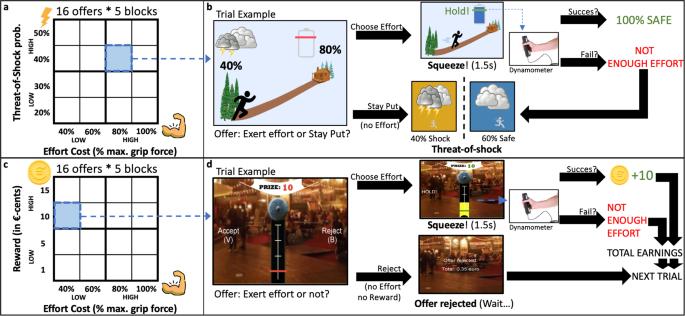Acute stress promotes effort mobilization for safety-related goals
引用次数: 0
Abstract
Although the acute stress response is a highly adaptive survival mechanism, much remains unknown about how its activation impacts our decisions and actions. Based on its resource-mobilizing function, here we hypothesize that this intricate psychophysiological process may increase the willingness (motivation) to engage in effortful, energy-consuming, actions. Across two experiments (n = 80, n = 84), participants exposed to a validated stress-induction protocol, compared to a no-stress control condition, exhibited an increased willingness to exert physical effort (grip force) in the service of avoiding the possibility of experiencing aversive electrical stimulation (threat-of-shock), but not for the acquisition of rewards (money). Use of computational cognitive models linked this observation to subjective value computations that prioritize safety over the minimization of effort expenditure; especially when facing unlikely threats that can only be neutralized via high levels of grip force. Taken together, these results suggest that activation of the acute stress response can selectively alter the willingness to exert effort for safety-related goals. These findings are relevant for understanding how, under stress, we become motivated to engage in effortful actions aimed at avoiding aversive outcomes. People who underwent acute stress tended to prioritize safety over effort minimization. This led stressed people to mobilize more effort than non-stressed people to avoid threats that have a low probability to occur.

急性应激可促进为实现安全相关目标而做出的努力
虽然急性应激反应是一种高度适应性的生存机制,但它的激活如何影响我们的决策和行动,还有很多未知之处。基于应激反应的资源调动功能,我们在此假设这一错综复杂的心理生理过程可能会增强人们从事费力、耗能行动的意愿(动机)。在两次实验中(n = 80,n = 84),与无压力对照组相比,暴露于有效压力诱导方案的参与者表现出更强的体力消耗意愿(握力),以避免可能经历的厌恶电刺激(电击威胁),但不是为了获得奖励(金钱)。利用计算认知模型将这一观察结果与主观价值计算联系起来,这种主观价值计算将安全放在首位,而不是尽量减少体力消耗;尤其是在面临只有通过高强度握力才能化解的不可能威胁时。综上所述,这些结果表明,急性应激反应的激活会有选择性地改变为安全相关目标而努力的意愿。这些发现有助于我们理解,在压力下,我们是如何产生动力去采取努力行动以避免厌恶结果的。承受急性压力的人倾向于优先考虑安全,而不是尽量减少努力。这导致压力过大的人比没有压力的人付出更多的努力来避免发生概率较低的威胁。
本文章由计算机程序翻译,如有差异,请以英文原文为准。
求助全文
约1分钟内获得全文
求助全文

 求助内容:
求助内容: 应助结果提醒方式:
应助结果提醒方式:


